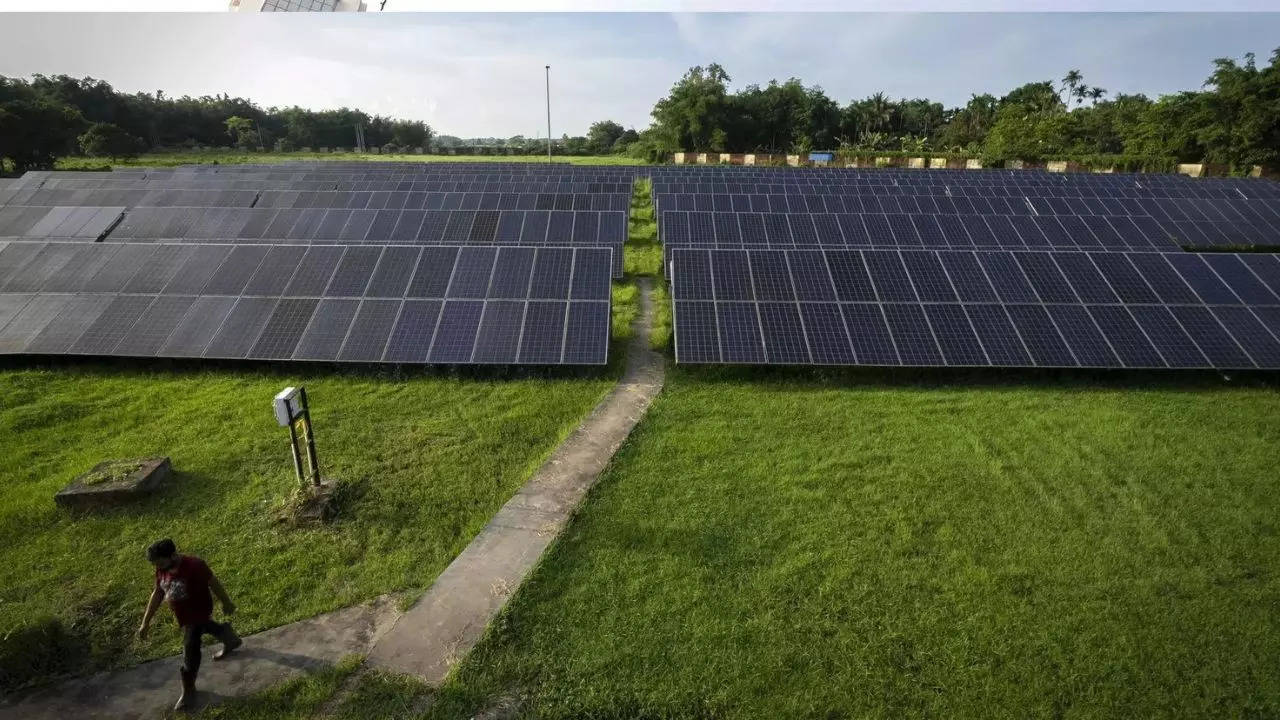Solar Plant: IIM Udaipur leads the way towards sustainability with a 500 kW solar plant | India News



The solar plant, set to cater to 30% of the institute’s energy needs, is anticipated to generate approximately 2,500 units per day and an impressive 7.30 lakh units annually. This substantial energy production is expected to result in an estimated financial saving of 18 lakhs per annum, a testament to the economic viability of sustainable energy solutions. Additionally, the solar plant will offset an estimated 543 tons of CO2 from the institute’s overall carbon footprint annually.
In conjunction with the solar plant installation, IIM Udaipur has illuminated the campus by installing 200 solar street light poles along a 3.5 km stretch of the inner peripheral road. Furthering their commitment to sustainability, plans are underway to install an additional 100 solar light poles within the campus near the Sports Complex and other venues, in the near future. This initiative not only enhances safety and visibility on campus by reducing dark spots but also saves approximately 1.20 lakh electrical units per annum, translating to approximately Rs.11 lakhs in financial savings.
Furthermore, this effort is projected to reduce an estimated 85 tons of CO2 from the institute’s overall carbon footprint each year. Prof. Ashok Banerjee, Director of IIM Udaipur, expressed enthusiasm for the project, stating, “Our vision at IIM Udaipur is rooted in sustainability and responsible growth. Installing the 500 kW solar plant and solar street light poles underscores our commitment to reducing our carbon footprint while embracing renewable energy solutions. We believe this initiative will inspire our academic community and set an example for sustainable practices.”
IIM Udaipur champions sustainability and environmental stewardship, leveraging innovation and strategic initiatives to create a cleaner, greener future for all. About IIM Udaipur IIM Udaipur is well on its way to becoming a globally recognised B-School. It has broken new ground by focusing on world-class research and transforming students into tomorrow’s managers and leaders. The Institute arrived on the global education stage by securing accreditation from the AACSB (Association to Advance Collegiate Schools of Business) in merely eight years of its establishment.
With this accreditation, IIM Udaipur is counted in the same league of global institutes, such as Harvard Business School, Wharton School at the University of Pennsylvania, and the MIT Sloan School. IIMU has been listed on the Financial Times (FT) Global MIM Ranking 2022 as well as the QS Global MIM Ranking 2020, only the 4th IIM, along with IIMs Ahmedabad, Calcutta, and Bangalore, to be in the FT Global MIM Ranking and only the 7th IIM in the QS 2021 Global MIM Rankings.
In both Rankings, IIM Udaipur is the youngest B-School in the world! IIMU is also currently ranked 4th in India, after ISB, IIM Ahmedabad and IIM Bangalore, for research in management according to the methodology used by UT Dallas, which tracks publications in the leading global journals.
function loadGtagEvents(isGoogleCampaignActive) { if (!isGoogleCampaignActive) { return; } var id = document.getElementById('toi-plus-google-campaign'); if (id) { return; } (function(f, b, e, v, n, t, s) { t = b.createElement(e); t.async = !0; t.defer = !0; t.src = v; t.id = 'toi-plus-google-campaign'; s = b.getElementsByTagName(e)[0]; s.parentNode.insertBefore(t, s); })(f, b, e, 'https://www.googletagmanager.com/gtag/js?id=AW-877820074', n, t, s); };
function loadSurvicateJs(isSurvicateActive){ if(!isSurvicateActive){ return; }
(function(w) { var s = document.createElement('script'); s.src="https://survey.survicate.com/workspaces/0be6ae9845d14a7c8ff08a7a00bd9b21/web_surveys.js"; s.async = true; var e = document.getElementsByTagName('script')[0]; e.parentNode.insertBefore(s, e); })(window);
}
window.TimesApps = window.TimesApps || {}; var TimesApps = window.TimesApps; TimesApps.toiPlusEvents = function(config) { var isConfigAvailable = "toiplus_site_settings" in f && "isFBCampaignActive" in f.toiplus_site_settings && "isGoogleCampaignActive" in f.toiplus_site_settings; var isPrimeUser = window.isPrime; if (isConfigAvailable && !isPrimeUser) { loadGtagEvents(f.toiplus_site_settings.isGoogleCampaignActive); loadFBEvents(f.toiplus_site_settings.isFBCampaignActive); loadSurvicateJs(f.toiplus_site_settings.isSurvicateActive); } else { var JarvisUrl="https://jarvis.indiatimes.com/v1/feeds/toi_plus/site_settings/643526e21443833f0c454615?db_env=published"; window.getFromClient(JarvisUrl, function(config){ if (config) { loadGtagEvents(config?.isGoogleCampaignActive); loadFBEvents(config?.isFBCampaignActive); loadSurvicateJs(config?.isSurvicateActive); } }) } }; })( window, document, 'script', );
Recent Posts
'मुख्यमंत्री कोविड-19 बाल सेवा योजना' के लिए नहीं है बजट? अब मंत्री नरेंद्र पटेल ने किया ये दावा
<p style="text-align: justify;"><strong>Madhya Pradesh News Today:</strong> भारत सहित पूरी दुनिया ने 3 साल वैश्विक महामारी…
Inside Hina Khan’s Pre-Birthday Celebrations With Rocky Jaiswal And Mother In Goa
Hina Khan’s birthday is on October 2. (Photo Credits: Instagram)From a stunning view of her…
Swiggy IPO Gets Sebi Approval: All You Need to Know About Rs 11,000-Crore Issue
Food and grocery delivery major Swiggy has received markets regulator Sebi’s clearance to launch its…
‘Imprints of Make in India visible everywhere’: PM Modi lauds 10 years of flagship initiative | India News
NEW DELHI: Prime Minister Narendra Modi on Wednesday lauded the efforts of each and every…
Waqf Amendment Bill JPC 1 Crore Emails Nishikant Dubey VHP Vinod Bansal Said it Email Jihad | वक्फ बिल पर 1 करोड़ से ज्यादा सुझाव: VHP बोली
Waqf Amendment Bill Email: वक्फ संशोधन बिल पर संयुक्त संसदीय समिति (जेपीसी) को सुझाव के लिए…
Georgia Meloni and Elon Musk date truth behind the viral photos
Meloni And Musk Viral Photos : दुनिया के सबसे अमीर शख्स एलन मस्क ज्यादातर किसी…
